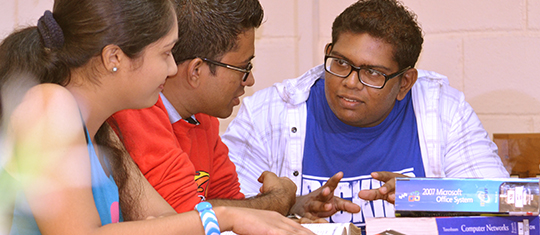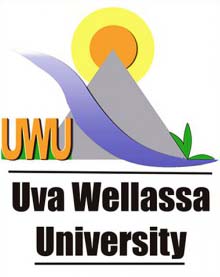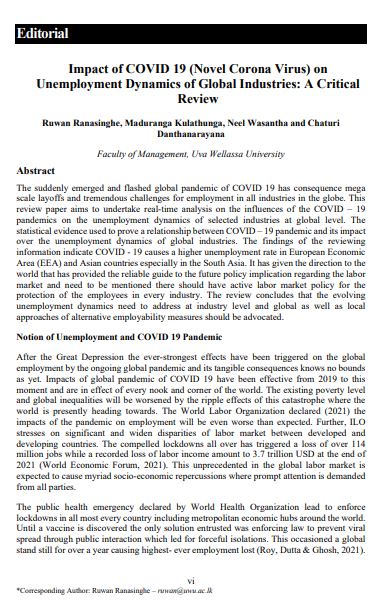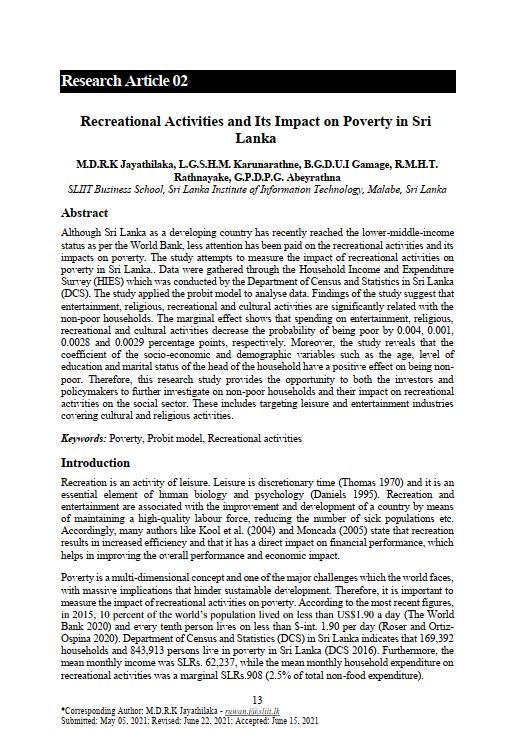Volume 05, Issue 01
TABLE OF CONTENTS
01. Study on the Perception of State University Graduates vs Government Hotel School Students on Hospitality industry Retention
L.A.P.C. Perera1 , A.M.N.M. Gangananda2, P.G.S.S. Pattiyagedara2, W.M.A.H. Bandara2
INFORMATION
Journal Title: Journal of Management and Tourism Research
Volume : 5 Issue : 01
Page : 1- 16
Authors : L.A.P.C.Perera1 , A.M.N.M. Gangananda2, P.G.S.S. Pattiyagedara2, W.M.A.H. Bandara2
1Department of Indigenous Health Sciences, Faculty of Indigenous Health Sciences and Technology, Gampaha Wickramarachchi University of Indigenous Medicine, Sri Lanka
2Department of Tourism Studies, Faculty of Management, Uva Wellassa University of Sri Lanka
1http://orcid.org/0000-0001-7262-5526
2https://orcid.org/0000-0002-1929-6636
ABSTRACT
The hospitality industry is a diversified and exciting business that focuses on providing high- quality experience to guests who are visiting particular destinations. To provide professional service to the guests, destinations and organizations required qualified and intelligent workforce. State Universities and hotel schools, as well as several other private universities provide hospitality education in Sri Lanka with the goal of developing industry-ready individuals and high skilled workforce that can match the workforce demand from the industry. Although there is a high demand for skilled workforce from the industry, retention of the graduates in the industry been questionable in Sri Lanka. To analyze this issue and to identify potential causes, this study was conducted by focusing on analysis of university graduates’ and hotel school students’ retention attitudes in the hospitality industry in Sri Lanka. The primary data was collected from 10 respondents representing State universities; Uva Wellassa, Sabaragamuwa, Rajarata, and the Sri Lanka Institute of Tourism and Hospitality Management, by using the purposive sampling technique. With the limits of COVID 19 pandemic, structured interviews were conducted over the phone. Content analysis method was used for the study since the study adopted the qualitative research design. Hospitality career retention attitudinal perceptions is the parental theme revealed from the collected data and eight sub themes were designed based on it. Major findings disclosed that university graduates’ retention is very low compared to the hotel school and the hotel school graduates retention rate is almost 100%. The career perception and the attitudes and satisfaction of university graduates vary with several external factors and hence they shift for other jobs after the industrial training period. The factors affect to the satisfaction and attitudinal changes of the university graduates and hotel school needed to be addressed in future studies.
Key Words : Career Perception Attitudes, Graduates, Hospitality Industry, Industry Retention
02.Solid Waste Management Challenges in Urban Councils of Developing CountriesCase Study with special reference to Boralesgamuwa Urban Council, Sri Lanka
R.M.N.M. Rathnayake1, W.N. Sellahewa2
INFORMATION
Journal Title: Journal of Management and Tourism Research
Volume : 5 Issue : 01
Page : 17- 34
Authors : R.M.N.M. Rathnayake1, W.N. Sellahewa2
1SLIIT Business School, Sri Lanka Institute of Information Technology, Malabe, Sri Lanka
2Faculty of Applied Sciences, Uva Wellassa University of Sri Lanka
ABSTRACT
Solid waste has emerged as a critical concern in developing countries. In Sri Lanka unplanned settlements in suburban areas, particularly in the Colombo district, have emerged from migration from rural to urban areas. This paper gives an overview of the situation of Solid Waste Management (SWM) by Urban Councils in Sri Lanka. The objective of this paper is to identify the challenges that Sri Lankan local government institutions have managing their solid waste, with a particular emphasis on the Boralesgamuwa Urban Council. Further, this paper studies Solid Waste Management procedures in local governments, as well as approaches to feasible solutions that might be implemented to improve Urban Councils’ Solid Waste (UCSW) services. This research is based on the primary data gathered through in-depth interviews. Accordingly, twenty (20) in-depth interviews were conducted with five officers, five waste collection workers, and ten civilians in the Boralesgamuwa area. The sample was chosen conveniently, and the Thematic analysis method was used to analyze the responses received from interviews. According to the findings, Boralesgamuwa Urban Council is in the stage of developing a Solid Waste Management strategy and there are various types of problems associated with existing practices. The Boralesagmuwa Urban Council’s plan for garbage collection is not being carried out as intended. In this research, it was found under the category of structural problems. Several issues about servants have come up in the Boralesgamuwa urban council. These problems include low morale among the staff, a lack of workers, inadequate facilities, low attendance, health problems, and poor work ethics. Transportation-related problems have been identified as including vehicle flaws and maintenance concerns. Finally, remedies have been suggested for the issues in each category.
Key Words : Challenges, Developing Countries, Solid Waste, Solid Waste Management, Urban Council
03. The Presence of the Doctor is the Beginning of the Cure: Moderator-Mediator Effect of the Physician in Customer Service Experience in Private Hospitals
M.A.Y.D. Madurapperuma1 , H.W.W.J.H.K. Sugathadasa 2
INFORMATION
Journal Title: Journal of Management and Tourism Research
Volume : 5 Issue : 01
Page : 35- 50
Authors : M.A.Y.D. Madurapperuma1, H.W.W.J.H.K. Sugathadasa2
1Department of Business Economics, University of Colombo
2Institute of Human Resource Advancement, University of Colombo
1https://orcid.org/0000-0002-7483-840X
2https://orcid.org/0000-0002-5075-7760
ABSTRACT
The relationships and processes of determining customer loyalty have been investigated under various contexts with different predictors. Customer/patient experience in healthcare services is considered unique in terms of the nature of the diseases, treatments, and emotions. Despite the fact that the overall patient experience is likely to be influenced by several important interacting agents of the healthcare system, the influence of physicians on patients’ experience is critical. Nevertheless, researches carried out previously appeared to disregard the interacting role of the physician in the customer service experience in the healthcare sector to a greater extent. Therefore, the study aims at investigating how customer experience, behavior of the physician, and customer satisfaction interact to bring about loyalty in customer/patient. Using a survey strategy, data were collected from a conveniently selected sample of 412 encompassing outdoor and in-house patients underwent treatments from hospitals located in the Colombo district. Regression and Hayes’s Process Macro were used as the main technique of analysis. The results confirm that physician behaviour moderates the relationship between customer service experience with hospitals and customer satisfaction. Moreover, customer service experience influences customer loyalty through customer satisfaction. The overall moderator-mediator effect that illustrates customer service experience with the hospital, associated with physician’s behaviour and this influences customer loyalty through customer satisfaction, and the findings show that the impact is significant. Based on the findings, it is recommended to design the service processes in a way to provide a unique experience to the customer/patient. In addition, the usage of formal feedback on physician’s behaviour introspectively is recommended. Further, the limitations and areas to be considered in future research studies are also discussed.
Keywords: Service Experience, Customer Satisfaction, Customer Loyalty, Physician’s Behaviour, Moderator-Mediator Effect
04. A Conceptual Review on Smart Tourism City towards Re building Sri Lankan Tourism
U.J. Mirando 1 , K.H.V.P. Kumarasinghe2
INFORMATION
Journal Title: Journal of Management and Tourism Research
Volume : 5 Issue : 01
Page : 51- 60
Authors :U.J. Mirando1, K.H.V.P. Kumarasinghe2
1Department of Marketing Management, University of Kelaniya Sri Lanka
2Department of Event Management, University College of Matara Sri Lanka
1https://orcid.org/ 0000-0003-1525-134X
2https://orcid.org/0000-0002-0641-0196
ABSTRACT
During the past decades, Sri Lanka has been one of the best tourist destinations in the world. Several books, authors, and websites have recently nominated that Sri Lanka is the best place to obtain a superior tourist experience. Considering Sri Lankan tourism sector has been influenced by Covid-19 pandemic situation in advance. Stakeholders of the tourism sector are struggling to find a new solution for the prevailing situation. At the same time, countries that are gaining several competitive advantages from the tourism sector have adopted the Smart tourism city concept. Because it is a timely concept to win this digital era, this study explored to provide critically review the literature on the Smart tourism city concept and the possibility of applying this concept into the Sri Lankan context. A rigorous literature review was carried out by choosing many conceptual and empirical papers mostly published after 2015 in reputed journals to evaluate the smart tourism cities concept discussed by many authors critically. The findings of this study provide valuable insights into the stakeholders in the Sri Lankan tourism sector to implement this concept successfully. Manly, government authorities, owners, and managers of the tourism sector should engage with digital technologies when providing their service package. Further, smart tourism cities should consider the main three pillars, namely human capital, infrastructure, and information. Not only that but also community collaboration is another critical factor that should pay attention. Further, this study developed a model that represents the connection between several components of a smart tourism city.
Keywords: Covid 19, Re-build Tourism, Smart Technology, Smart Tourism Cities
05. Smart Classrooms in Schools in Sri Lanka: A Case Study on the Design and Use of Smart Learning Space
V.Vijayabaskar
INFORMATION
Journal Title: Journal of Management and Tourism Research
Volume : 5 Issue : 01
Page : 61- 68
Authors : V.Vijayabaskar
Department of Education, University of Jaffna
ABSTRACT
The integration of information Technology with the educational process creates smart learning environments that facilitate student engagement, teaching and learning and evaluation through physical and virtual classroom settings. The transformation in classroom settings through the adoption of information and communication technology is generally solicited as a means for improving the educational outcomes. The transformation of learning space from the traditional classrooms to smart classrooms is mainly characterized by the infusion of technology into the pedagogical process of schools. Smart classrooms are expected to address the issues and demands of present context of education that emerge through the changes in the elements of education system: students; teachers; curriculum; available resources for the process and, the social background of the schools. In this context smart classroom were introduced in the schools in Sri Lanka since 2017. This study examined the design and use of learning space formulated by interacting axes of domains of smart class rooms: the architectural layout and ergonomic structure; integration of technology and; appropriate pedagogical methodology in smart classrooms. A collective case study approach is used to investigate the research problem. Four schools belonging to 1AB, 1C, Type II and Type III categories were selected from the Valikamam Education Zone of Jaffna district of Sri Lanka as cases. Interviews, document study and observation were used to gather the data. The findings from analyses of cases indicated that the teachers did not perceive much technology enhanced smart learning space in their smart classrooms, while principals are not fully aware about the key characteristics of the three-interacting axis of domains in design and use of smart learning space. The layout and ergonomic structure of smart classrooms is satisfactory except their interior topology and furniture, which are not conducive for interactive learning. Integration of technology is very limited with the basic digital devices available only for the use of teacher while the students are engaged in the lesson only with their exercise books that impedes student centered learning and interaction with teacher and class through the technological platform. The pedagogical methodology is not suitable as the teachers still follow traditional way of teaching without the innovative and creative use of digital devices and the internet. Thus, an effective smart learning space could not be constructed due to defects in the three axes of domains of the smart classrooms.
Keywords: Smart Classroom, Smart Learning Space, Technology Integration, Transformation in Classroom





